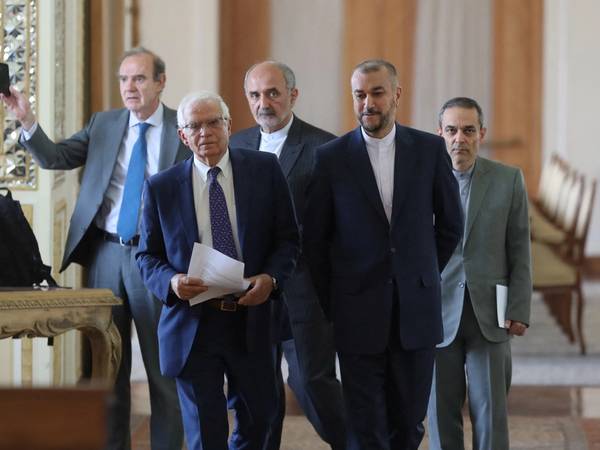Iranian media and commentators have shown mixed reactions to the idea of holding the next session of nuclear negotiations in a Persian Gulf country, Qatar.
Hardline newspaper Kayhan on Monday carried a frontpage headline that said: "Negotiations in Qatar is a trap. We should not reward America."
Kayhan and its chief editor Hossein Shariatmadari are affiliated with the office of Supreme Leader Ali Khamenei.
The Kayhan wrote, "The venue of the negotiations is not the main issue. What matters is that we should not reward the United States for sending [EU Foreign Policy chief] Josep Borrell to Tehran and laying a diplomatic trap for Iran. We should not be overwhelmed and should not welcome the continuation of the negotiations, which means stepping back from our positions and our main condition."
After year-long talks in Vienna came to a standstill in March, it became apparent that Tehran was insisting on the removal of its Revolutionary Guard from the US list of Foreign Terrorist Organizations.
Meanwhile, many Iranians on social media noted that Borrel simply used the term Gulf when speaking about the venue of the talks, a sensitive issue for Iranians who reject a habit by international media and politicians to call the Persian Gulf, simply “Gulf”, or “Arabian Gulf” in rare cases.
It also listed several headlines from US and regional media that said the US ‘maximum pressure’ policy has failed and Iran's position has been strengthening during the past months. The Kayhan insisted that "Iran is powerful" and then asked: "Why should we need negotiation with the evil and criminal West?"
Kayhan also expressed concern that "negotiating in the region might undermine the interests of Russia and China, the two countries that have voted against the IAEA Board of Governor's resolution against Iran." The daily then called on Iranian diplomats to insist on the lifting of all sanctions against Iran, to verify US measures and demand guarantees from Washington."
Meanwhile in an interview with the reformist Arman Emrooz newspaper, former diplomat Jalal Sadatian warned that Iran should not be optimistic toward the upcoming round of negotiations although it looks like that the meeting in Qatar is going to have a more serious approach to the nuclear issue than the ones in Vienna.
Nonetheless, he was not optimistic about the upcoming talks as he believed that “Russia is still against an agreement” and that is why Moscow sent Foreign Minister Lavrov to Tehran shortly before Borrell's visit
Foreign relations analyst and former lawmaker Ahmad Bakhshayesh told Arman Emrooz that the West has realized pressures on Iran has brought it closer to te East (China) where it is selling its oil. He added that under pressure from the energy implications of the war in Ukraine, the West is trying to embrace Iran once again before the next winter.
Bakhshayesh echoed what Sadatian also said that Iranian and US negotiators will talk face to face without any need for mediators. However, he did not explain why he thinks so. He added that Russia has the upper hand in Ukraine and the West needs to find a replacement for the oil from Russia and Iran seems to be the best possible replacement.
Meanwhile, foreign policy analyst Diako Hosseini said in an interview with ILNA that both Iran and the United States see the JCPOA as serving their interests and if talks resume, this would be the last round and an agreement will be at hand.
